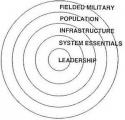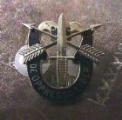Where does it state that COIN requires a functioning government? If you buy into Bob's World's arguments then the conditions were set for insurgency because the State wasn't functioning well to begin with.
I think Karzai is more than a Mayor and he extends control beyond Kabul, but as you state he doesn't control a lot beyond Kabul. If it isn't an insurgency what is it? A civil war? If that was the case then the doctrinal approach (I'm not saying this is right) would be peace enforcement.
















 )
) ), works well until the cash is gone and the population and local military go haywire, then it's every man for himself. Many of the governments never reached maturity but there were obvious reasons for that. Then we once again indignantly step in and cut off the remaining support
), works well until the cash is gone and the population and local military go haywire, then it's every man for himself. Many of the governments never reached maturity but there were obvious reasons for that. Then we once again indignantly step in and cut off the remaining support 

Bookmarks